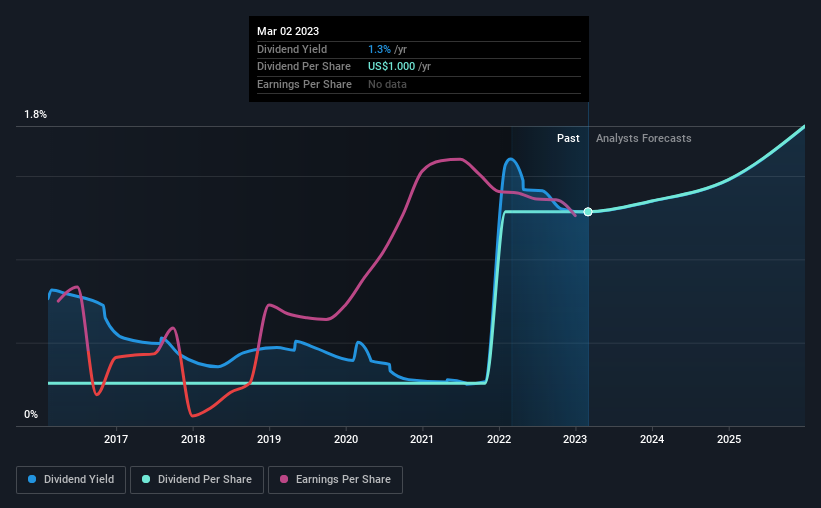- United States
- /
- Capital Markets
- /
- NYSE:PJT
Here's What We Like About PJT Partners' (NYSE:PJT) Upcoming Dividend

PJT Partners Inc. (NYSE:PJT) is about to trade ex-dividend in the next 4 days. The ex-dividend date is usually set to be one business day before the record date which is the cut-off date on which you must be present on the company's books as a shareholder in order to receive the dividend. The ex-dividend date is important as the process of settlement involves two full business days. So if you miss that date, you would not show up on the company's books on the record date. Accordingly, PJT Partners investors that purchase the stock on or after the 7th of March will not receive the dividend, which will be paid on the 22nd of March.
The company's upcoming dividend is US$0.25 a share, following on from the last 12 months, when the company distributed a total of US$1.00 per share to shareholders. Based on the last year's worth of payments, PJT Partners has a trailing yield of 1.3% on the current stock price of $77.88. Dividends are a major contributor to investment returns for long term holders, but only if the dividend continues to be paid. As a result, readers should always check whether PJT Partners has been able to grow its dividends, or if the dividend might be cut.
Check out our latest analysis for PJT Partners
Dividends are typically paid out of company income, so if a company pays out more than it earned, its dividend is usually at a higher risk of being cut. That's why it's good to see PJT Partners paying out a modest 28% of its earnings.
Generally speaking, the lower a company's payout ratios, the more resilient its dividend usually is.
Click here to see the company's payout ratio, plus analyst estimates of its future dividends.

Have Earnings And Dividends Been Growing?
Stocks in companies that generate sustainable earnings growth often make the best dividend prospects, as it is easier to lift the dividend when earnings are rising. If business enters a downturn and the dividend is cut, the company could see its value fall precipitously. It's encouraging to see PJT Partners has grown its earnings rapidly, up 48% a year for the past five years.
Many investors will assess a company's dividend performance by evaluating how much the dividend payments have changed over time. PJT Partners has delivered an average of 26% per year annual increase in its dividend, based on the past seven years of dividend payments. It's great to see earnings per share growing rapidly over several years, and dividends per share growing right along with it.
Final Takeaway
From a dividend perspective, should investors buy or avoid PJT Partners? Companies like PJT Partners that are growing rapidly and paying out a low fraction of earnings, are usually reinvesting heavily in their business. This is one of the most attractive investment combinations under this analysis, as it can create substantial value for investors over the long run. In summary, PJT Partners appears to have some promise as a dividend stock, and we'd suggest taking a closer look at it.
In light of that, while PJT Partners has an appealing dividend, it's worth knowing the risks involved with this stock. In terms of investment risks, we've identified 1 warning sign with PJT Partners and understanding them should be part of your investment process.
If you're in the market for strong dividend payers, we recommend checking our selection of top dividend stocks.
New: Manage All Your Stock Portfolios in One Place
We've created the ultimate portfolio companion for stock investors, and it's free.
• Connect an unlimited number of Portfolios and see your total in one currency
• Be alerted to new Warning Signs or Risks via email or mobile
• Track the Fair Value of your stocks
Have feedback on this article? Concerned about the content? Get in touch with us directly. Alternatively, email editorial-team (at) simplywallst.com.
This article by Simply Wall St is general in nature. We provide commentary based on historical data and analyst forecasts only using an unbiased methodology and our articles are not intended to be financial advice. It does not constitute a recommendation to buy or sell any stock, and does not take account of your objectives, or your financial situation. We aim to bring you long-term focused analysis driven by fundamental data. Note that our analysis may not factor in the latest price-sensitive company announcements or qualitative material. Simply Wall St has no position in any stocks mentioned.
About NYSE:PJT
PJT Partners
An investment bank, provides various strategic advisory, shareholder advisory, capital markets advisory, and restructuring and special situations services to corporations, financial sponsors, institutional investors, and governments worldwide.
Outstanding track record with flawless balance sheet.


